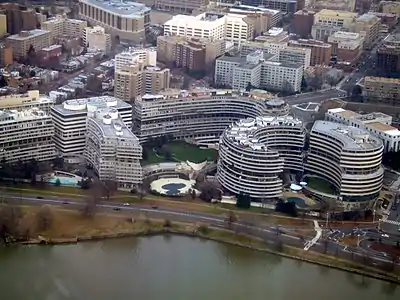White House horrors
The revelation of the existence and scope of crimes and abuses committed by Nixon's staff during his presidency, known collectively as the "White House Horrors" (a term attributed to Richard Nixon's former United States Attorney General John N. Mitchell),[1][2] was among the many events of the Watergate scandal. More than 70 people were convicted of crimes related to Watergate; some pleaded guilty before trial.
| Watergate scandal |
|---|
 |
| Events |
| People |
Here is a listing of much of the criminality involved:
- Breaking into Daniel Ellsberg's psychiatrist's office.
- Mitchell gave approval to the break-in at the Watergate.
- Charles Colson proposed firebombing the Brookings Institution and seizing politically damaging documents the President wanted destroyed.[3]
- E. Howard Hunt fabricated documents implicating John F. Kennedy in the assassination of South Vietnamese President Diem.
- John Ehrlichman ordered FBI Director L. Patrick Gray to take possession of the files in Hunt's safe, keeping them secret from prosecutors.
- Gray destroyed the evidence from Hunt's safe.
- Watergate investigator Henry E. Petersen gave John Dean secret grand jury testimony.
- Gray at the FBI gave Dean access to all FBI investigation files.
- Creation of the White House Plumbers to plug leaks through the use of illegal wiretaps.
- Operation Sandwedge: The Jack Caulfield operation designed to orchestrate a massive campaign to spy on the Democrats.
- Ehrlichman falsely claimed he did not know in advance about the Ellsberg break-in.
- Gemstone: The Liddy operation to kidnap students who might disrupt the Republican convention in 1972; use prostitutes to compromise Democratic politicians. Attorney General Mitchell objected to the plan on the grounds it cost too much; he later approved a scaled-down plan. Mitchell, Haldeman and Jeb Magruder approved of Gemstone.
- Hush money paid to Watergate break-in defendants.
- Nixon promised clemency to Watergate criminals.
- Caulfield sent to Chappaquiddick Island to pose as a reporter to dig up dirt on Ted Kennedy before all the leaks.
- Nixon is heard on the tapes telling Ehrlichman in April 1973 that he should hint to Dean to "stay on the reservation" because in the end the only man who can grant Dean clemency and save his ability to practice law is the president.
- Charles Colson was guilty of offering clemency to Hunt at Nixon's orders.
- Nixon told Petersen to stay out of the Ellsberg psychiatrist's break-in on the grounds that an investigation would compromise national security.
- Nixon proposed to Alexander Haig and Fred Buzhardt that they fabricate evidence—a missing dictabelt tape—wanted by Judge John Sirica; both refused.
- Nixon ordered the IRS to audit the tax returns of Larry O'Brien, head of the Democratic National Committee.
- Nixon ordered the IRS to stop an investigation of Howard Hughes.
- Huston Plan: In June 1970 Tom Huston persuaded the heads of the CIA, DIA, and NSA to approve a plan for black bag jobs against "enemies" of the Nixon administration. (J. Edgar Hoover opposed the Huston Plan; Nixon, fearful Hoover would blackmail him by leaking word of the plan, dropped it.)
See also
References
- The Watergate hearings: break-in and cover-up; proceedings. New York: Viking Press. 1973. p. 378. ISBN 0-670-75152-9. OCLC 865966.
- Dean, John W (1976). Blind ambition: the White House years. New York: Simon and Schuster. p. 123. ISBN 0-671-22438-7. OCLC 2373288.
- Tapes Show Nixon Ordering Theft of Files New York Times, November 22, 1996 Accessed September 10, 2014
This article is issued from Wikipedia. The text is licensed under Creative Commons - Attribution - Sharealike. Additional terms may apply for the media files.